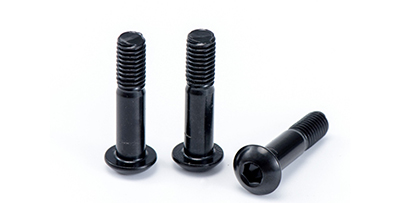Button head socket cap Screws are widely used in various industries due to their unique design, which allows for easy installation and a sleek appearance. The choice of material for these Screws is crucial, as it directly affects their strength, corrosion resistance, and suitability for specific applications. This article explores the different materials used to manufacture button head socket cap Screws, focusing on stainless steel, carbon steel, and alloy steel, along with their respective advantages.

1. Stainless Steel
Overview:
Stainless steel is one of the most popular materials for button head socket cap Screws, renowned for its excellent corrosion resistance and durability. It is primarily composed of iron, carbon, and a minimum of 10.5% chromium, which forms a passive layer of chromium oxide on the surface, protecting it from corrosion.
Advantages:
Corrosion Resistance: Stainless steel screws are highly resistant to rust and corrosion, making them ideal for applications in humid or corrosive environments, such as marine or chemical processing industries.
Aesthetic Appeal: The shiny surface of stainless steel provides a clean and polished look, which is often desirable in visible applications, such as furniture and decorative fixtures.
Strength and Durability: Stainless steel has a high tensile strength, ensuring that button head socket cap screws maintain their integrity under stress and load.
Low Maintenance: The corrosion-resistant properties of stainless steel lead to lower maintenance requirements over time, making it a cost-effective choice in the long run.
2. Carbon Steel
Overview:
Carbon steel is a widely used material for button head socket cap screws, primarily composed of iron and carbon. It is known for its strength and versatility but does not possess the same level of corrosion resistance as stainless steel.
Advantages:
High Strength: Carbon steel offers excellent tensile strength, making it suitable for heavy-duty applications where high strength is required.
Cost-Effective: Carbon steel is typically more affordable than stainless steel, making it a popular choice for applications where cost is a significant factor.
Ease of Machining: Carbon steel is relatively easy to machine, allowing for precise manufacturing of button head socket cap screws with tight tolerances.
Variety of Grades: Carbon steel comes in various grades, allowing users to select the most appropriate strength level for their specific application.
Note:
To enhance corrosion resistance, carbon steel screws can be treated with coatings such as zinc plating, black oxide, or other protective finishes. However, these coatings may wear off over time, necessitating regular maintenance.
3. Alloy Steel
Overview:
Alloy steel is a type of steel that is alloyed with various elements, such as nickel, chromium, and molybdenum, to enhance its mechanical properties. This material is commonly used for button head socket cap screws in demanding applications.
Advantages:
Improved Mechanical Properties: Alloy steel offers superior strength, hardness, and toughness compared to both stainless and carbon steel, making it ideal for high-stress applications, such as automotive and aerospace industries.
Enhanced Wear Resistance: The addition of alloying elements improves the wear resistance of the screws, prolonging their lifespan in abrasive environments.
Heat Treatment Capability: Alloy steel can be heat-treated to achieve specific properties, such as increased strength and hardness, allowing for customization based on application requirements.
Versatile Applications: Due to its strength and durability, alloy steel is suitable for a wide range of applications, including construction, machinery, and high-performance assemblies.
The choice of material for button head socket cap screws plays a crucial role in their performance and suitability for specific applications. Stainless steel, carbon steel, and alloy steel each offer distinct advantages, making them ideal for different environments and requirements.
Stainless steel is preferred for its corrosion resistance and aesthetic appeal, while
carbon steel is chosen for its strength and cost-effectiveness.
Alloy steel provides enhanced mechanical properties for high-demand applications.
When selecting button head socket cap screws, it is essential to consider the application environment, load requirements, and budget constraints to ensure optimal performance and longevity. By understanding the properties of each material, users can make informed decisions that align with their specific needs.





